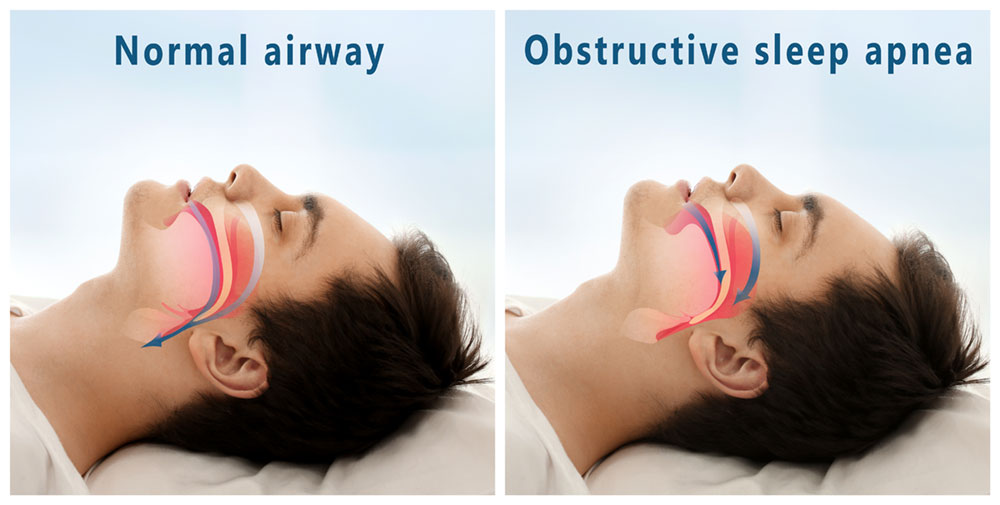Do You Have Sleep Apnea?
Sleep apnea is a dangerous condition where breathing repeatedly stops and starts throughout the night. The frequent loss of oxygen can wreak havoc on your relationships and your health. When you’re not getting the sleep you need, it affects nearly every aspect of your life.
Fortunately, Dr. Winkelmann offers several solutions to treat sleep apnea. He’ll work with you to find the best treatment option so you can begin reversing the harmful effects of the disorder and start enjoying quality sleep, followed by rejuvenated mornings.

The Different Types of Sleep Apnea

There are two main types of sleep apnea:
- Obstructive Sleep Apnea (OSA) – This is the most common form of sleep apnea. It occurs when the soft tissues around your throat relax, which blocks your airway and temporarily stops your breathing.
- Central Sleep Apnea – This type of sleep apnea occurs when the brain isn’t sending the proper messages to the body to breathe during sleep. Central sleep apnea is typically the result of an underlying health condition and is treated differently than OSA.
Symptoms of Sleep Apnea
No matter which type of sleep apnea you have, the symptoms are the same. You or your partner may be the first to notice them. Signs that may indicate you have sleep apnea include:
- Waking up gasping for air or choking
- Excessive daytime fatigue
- Loud snoring
- Irritable
- Mood changes
- Difficulty concentrating
- Paused breathing during sleep


The Dangers of Sleep Apnea
Quality sleep plays an integral role in the way your body functions. Without it, your brain is unable to properly regulate hormones and file your memories from the day. Sleep apnea can also lead to weight gain, which can increase the severity of the disorder.
Patients with untreated sleep apnea are at a greater risk for motor vehicle accidents, have decreased neurocognitive functioning, and an overall reduction in their quality of life. Even with access to healthcare, up to 80% of sleep apnea cases are undiagnosed.
When the disorder is untreated, it can lead to long-term health consequences such as heart disease, strokes, Alzheimer’s disease, high blood pressure, and diabetes.
Frequently Asked Questions
How is sleep apnea diagnosed?
Sleep apnea is diagnosed with a sleep study. A sleep study can be performed in the comfort of your own home or in a lab under the supervision of a physician.
With the take-home test, you’ll receive the sleep test equipment from your physician and return it to them after you’ve conducted the test. The equipment will monitor your heart rate and breathing, as well as the oxygen level in your blood.
Once your physician diagnoses you with sleep apnea, Dr. Winkelmann can help you find a treatment option that best suits you.
Are sleep apnea and snoring the same thing?
Most people who have sleep apnea snore, but not all people who snore have sleep apnea. Loud and frequent snoring is one of the most common and noticeable signs of sleep apnea. If you snore, we highly recommend you undergo a sleep study to determine if, in fact, you have sleep apnea.
Once you’re diagnosed with sleep apnea, we can begin treatment immediately. Whether you have sleep apnea or simply snore, we’ll assist you with treatment so you and your partner can start enjoying restful nights.
Does oral appliance therapy work?
Yes! Oral appliance therapy is a quiet, convenient, and comfortable way to tackle snoring and sleep apnea symptoms. It’s a custom-fitted oral device that works by gently repositioning the tongue or jaw to eliminate any obstructions in the airway.
With oral appliance therapy, Dr. Winkelmann can help improve your sleep, restore your energy, and benefit your overall health. If you suffer from sleep apnea, schedule a consultation with Dr. Winkelmann by contacting our Wake Forest office at (984) 237-1013.
During the consultation, Dr. Winkelmann will examine your head and neck function, the roof of your mouth, throat, tongue, neck, posture, body mass, and your nasal septum to look for any areas that may cause an airway obstruction. He’ll determine if you would benefit from a sleep study so you can begin treatment right away.
What are the risk factors for sleep apnea?
Both forms of sleep apnea can be exacerbated by common factors, which include:
- Age — older patients are at a higher risk for sleep apnea
- Gender — males are at a higher risk for sleep apnea
Risk factors for obstructive sleep apnea include:
- Excess weight
- Circumference of the neck — thick necks may have narrower airways
- Family history
- Smoking
- Alcohol use
- Nasal congestion
Get the Sleep You Need to Be Yourself
If you have sleep apnea, Dr. Winkelmann will create a customized treatment plan to meet your needs so you can enjoy the effects of a quality night of rest. Contact our Wake Forest office to schedule a consultation by calling (984) 237-1013.
Dr. Craig Winkelmann is an experienced sleep dentist. In fact, he’s received the prestigious honor of being named a Diplomate Dentist by the American Academy of Dental Sleep Medicine. He’s been selected as one of America’s Top Dentists eight times in the last ten years. The foundation of his practice is built on the trust and rapport he strives to build and maintain with his patients.
